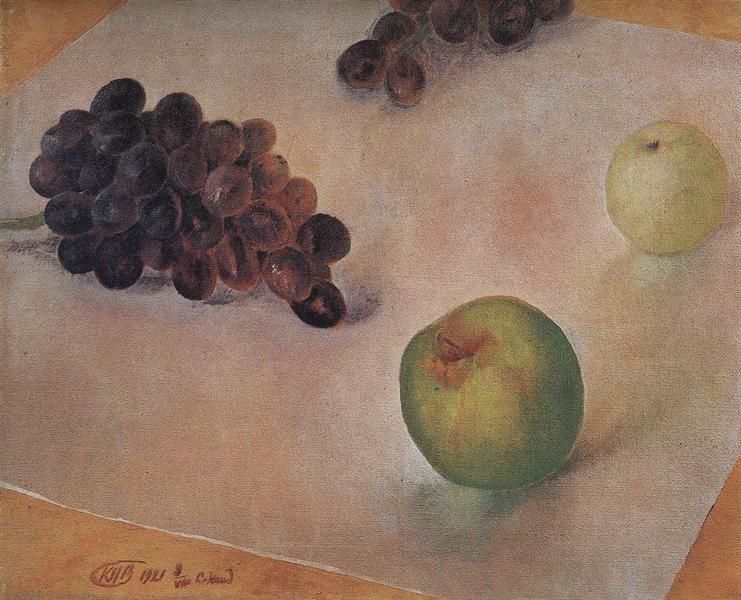Description
The work "Still Life -1921 "by Kuzma Petrov-Vodkin is erected as a silent testimony of artistic skill and the unique perspective of the Russian painter. Kuzma Petrov-Vodkin, known for her ability to amalgamate elements of different pictorial traditions, presents an exploration in this piece introspective of the daily object, raising it to an almost spiritual contemplation plane.
One of the first elements that captures the observer's attention is the careful composition of the work. Petrov-Vodkin chooses a precise geometric distribution, where each object seems to have been meticulously positioned. In the center of the composition are common objects, such as fruits and utensils, arranged on a surface whose unconventional inclination provides subtle dynamism to the scene. This choice challenges the traditional norms of the linear perspective, while inviting the viewer to reconsider the spatial relationship between objects.
The use of color in "Still Life - 1921 "It is another remarkable characteristic. Petrov-Vodkin opts for a palette of sober colors, predominantly the ocher, blue and green, which, although they do not seek to excel for their liveliness, denote an introspective tranquility and an emotional depth that brushes the ethereal. This chromatic control reinforces the atmosphere of meditative contemplation that emanates from the work.
The choice of objects present in the still life It is also worthy of analysis. At first glance, it looks like a random selection of fruits and containers, but a more thorough exam reveals the deliberate intention of Petrov-Vodkin to relate its works to its temporal and cultural context. The apparent simplicity of objects contrasts with the complexity of their disposition and the intensity of their representation, suggesting a deep reflection on everyday life and its importance.
Petrov-Vodkin, formed in Russian academic traditions but always in search of stylistic innovations, there is an almost mystical sense of spirituality in this work. Unlike other contemporaries of his who bowed to the dynamism of futurism or the fragmentism of Cubism, Petrov-Vodkin remains faithful to a more classic representation, although not exempt from experimentation.
The influence of Byzantine art and orthodox iconography in his work is undeniable and manifested in the "Still Life - 1921 "Through the frontal disposition and almost reverential treatment of objects. This approach not only highlights the intrinsic beauty of common elements, but also evokes a broader connection with spirituality and transcendence.
In the context of his time, Petrov-Vodkin's work reflects a period of transition and experimentation in Russian art. After the 1917 revolution, artists sought new ways to express reality and experiment with forms and content. Petrov-Vodkin, with its inclination towards introspection and spirituality, offers a perspective that contrasts with the most radical trends, advocating a leisurely reflection and an appreciation of the daily object.
In conclusion, "Still Life - 1921 "by Kuzma Petrov-Vodkin is not simply a static representation of everyday objects; it is a door open to the intimate and spiritual universe of the artist. Through its meticulous composition, its palette of moderate colors and its deep symbolism, the work invites to the spectator to stop and reflect on the beauty and importance of the material world.
KUADROS ©, a famous paint on your wall.
Hand-made oil painting reproductions, with the quality of professional artists and the distinctive seal of KUADROS ©.
Art reproduction service with satisfaction guarantee. If you are not completely satisfied with the replica of your painting, we refund your money 100%.

